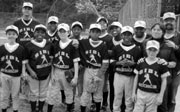FOR ALL OF YOU Northwesterners who’ve never traveled outside the Pacific time zone, let me assure you: The Southeast is a strange, strange place. A week-end visit with my girlfriend to Charleston, S.C., drove this point home acutely. Down South, chefs fry everything—from tomatoes to crab. Down South, mullets outnumber other haircuts by a count of at least two to one. Perhaps most disturbingly, down South, segregation is alive and well, thriving like a batch of fresh-caught prawns.
Sure, over the years local and federal officials have passed laws and rendered court decisions designed to make African Americans equal members of society. Still, a walk through Charleston proves that in nearly 150 years very little has changed. White people run the place, and black people serve them, pretty much across the board. It makes the oppressive humidity seem refreshing.
Such de facto inequalities are nothing new—not in the South, not in the Northwest, not anywhere. Thirty years ago this week, the federal government passed another set of laws, dubbed Title IX. These laws were designed to cure gender segregation, to give female athletes the same opportunities as their male counterparts to play sports in school. By and large, the laws have worked; over the years, the legislation spawned women’s skiing, soccer, volleyball, and hockey. Title IX produced a pool of athletes that allowed for the eventual establishment of professional women’s sports leagues, including the WNBA, home of the Seattle Storm.
On the surface, these professional endeavors have given women further opportunities to play the games they love. Dig deeper, however, and many of these efforts seem as “equivalent” as the socioeconomic situation in the South. The average yearly salary for WNBA players hovers around $40,000, while the average salary for NBA players is about $4.5 million. The U.S. women’s soccer team can kick anyone’s ass, but the overachieving men grab all the headlines. Women’s tennis is one of the most popular sports in the world, yet in every major grand slam event, it still plays second fiddle to the men’s game.
Equal salaries, equal marketing, equal treatment—female athletes should stop at nothing less, because they deserve it all. Here in Seattle, we could take the lead and put together a women’s major-league baseball club to play a fall season under the roof at Safeco Field. Something tells me the Seattle Sirens would draw quite a crowd. At the very least, they could get us over the impending Mariners collapse and four months of Seahawks football.
Matt Villano








